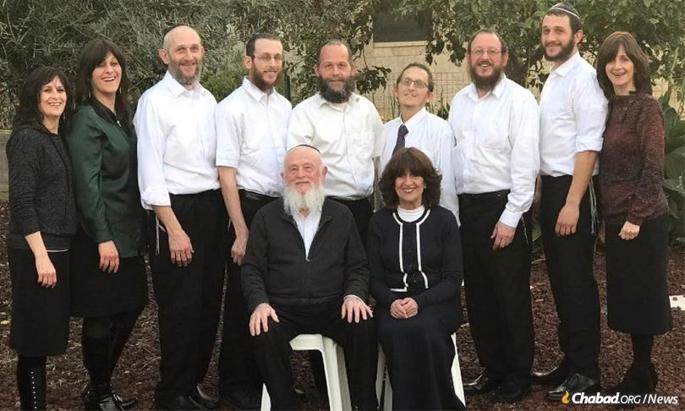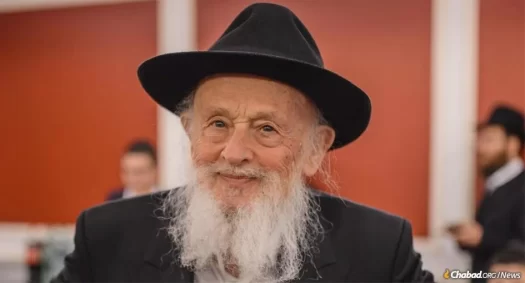
Obituary: Rabbi Avraham Yitzchak Sasonkin, 84, Beloved Mentor in Israel
by Menachem Posner – chabad.org
He was a familiar sight in the Chabad-Lubavitch yeshivah in Migdal HaEmek, a scenic town in the north of Israel, where he served as a Chassidic mentor for the students in the Russian-language division. But few knew the story of Rabbi Avraham Yitzchak Sasonkin, who passed away this week at the age of 84.
Known as Avremel, he was born in Leningrad, USSR, in the winter of 1938 to Rabbi Moshe and Ita Sasonkin — staunch and devoted members of the underground Chassidic community that struggled to uphold Jewish life under the crushing Communist regime.
On Feb. 26, 1938, when Avremel was just two months old, his father Moshe was taken away by the Soviet NKVD secret police and never seen again. Moshe’s younger brother, Chaim, was arrested on the same night. Documents released in the post-Soviet era showed that both brothers were charged with participating in Tiferes Bachurim, a Chabad yeshivah program that facilitated Torah study for young working men, or in the NKVD’s words: “a counter-revolutionary nationalist organization.” The brothers were sentenced to 10 years imprisonment and eventually sent to a Gulag in the frozen far northern Komi republic, where Chaim passed away in the summer of 1942, and Moshe on March 17, 1943 (10 Adar II, 5703.)
With the outbreak of the Second World War, Ita Sasonkin took her children, Chana Faiga and Avremel, to a kolkhoz (“communal farm”) in Siberia. There, Ita would bake matzah and light Shabbat candles secretly so that the people with whom they were forced to share a house would not detect that she was observing Judaism, which would be grounds for her children to be taken away.
When her father-in-law, Rabbi Nachum Shmaryahu Sasonkin, found out where they were, he invited them to join him in Samarkand, in Soviet Uzbekistan. Far from the war front, the Chassidic Jews who escaped there also found a brief reprieve from the government’s unrelenting persecution of religion.
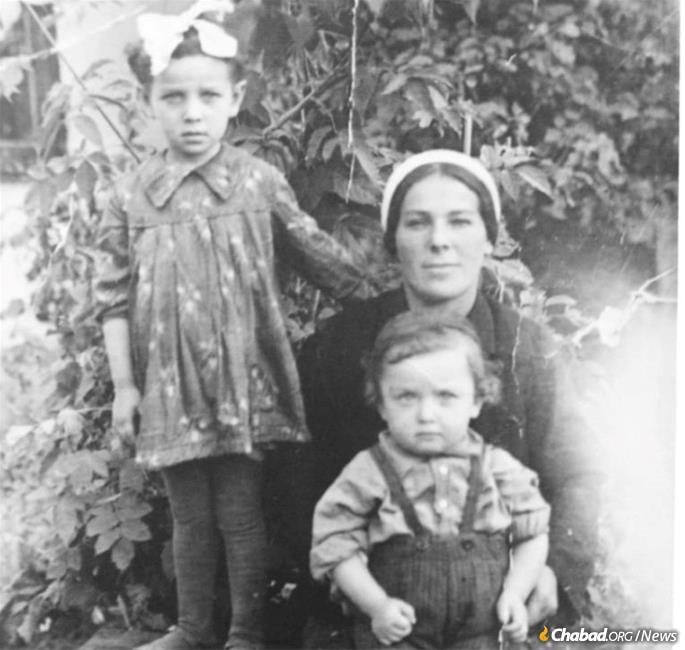
In Samarkand, Avremel was among the first students in the Jewish school (cheder) that was formed, learning under the tutelage of Zushe der Shamash (“the caretaker”) and then others.
In 1946, some of the Sasonkin family were able to join the 1,200 or so Chabad Chassidim who were then sneaking out under the Iron Curtain with forged passports. (The only surviving Sasonkin brother, Asher, was unable to escape and spent the next decades in and out of Soviet custody before finally being granted an exit visa in 1964).
At one point during the escape, there was panic involving a pregnant member of the party, and in an effort to gain control, soldiers began shooting into the air. Avremel’s mother, Ita, ran toward the soldiers and begged them not to shoot, but the soldier instead shot her point blank. She had been killed in front of the eyes of her young son.
Now doubly orphaned, Avremel and his sister were raised by their grandparents, Rabbi Nachum Shmaryahu and Malka Sasonkin. When they finally reached the DP camp in Pocking, Germany, Avremel was enrolled in the new Chabad yeshivah opened there, before continuing his studies in Paris.
In time, the family made their way to the newly declared State of Israel, and Avremel studied in the Chabad yeshivahs there, first in Rishon Letzion and then in Lod.
Correspondence With the Rebbe
As a young teen, he began writing letters to the Rebbe—Rabbi Menachem M. Schneerson, of righteous memory — telling of his challenges at yeshivah and how he found it difficult to grow up with neither father nor mother. Each time, the Rebbe would reply with encouragement and understanding.
“I had a dream to visit the Rebbe,” he related in an unpublished interview with JEM’s “My Encounter With the Rebbe Project.” “But it was just a dream. I needed an exit permit from Israel, a visa to the U.S., permission from the Rebbe, and a lot of money, which I did not have.”
Years passed.
“My yearning to be with the Rebbe was stronger and stronger,” he recalled. “Friends in New York helped me with a visa and with funds, and I was finally able to travel.”
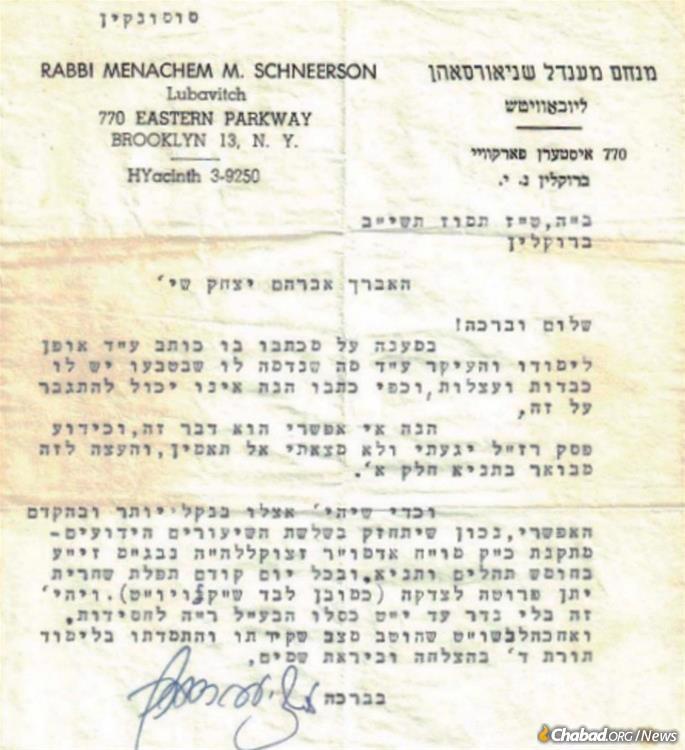
Before Passover of 1960, he docked in New York, where met the Rebbe for the first time.
He relished the visit, which lasted nine months, receiving guidance from the Rebbe and listening to the Rebbe’s talks. At one point, he confided in the Rebbe, writing that he often felt the urge to cry, and the Rebbe replied that it was OK to do so, and it was not advisable to try to suppress his tears.
When his Israeli exit permit was soon to expire, he returned to Israel, stopping in London and Manchester to deliver personal regards from the Rebbe.
At the Rebbe’s directive, he began teaching in “the Reshet,” the network of Chabad day schools in Israel. The students were mostly fresh immigrants from Arab lands, and the classes were large, often topping 40 students. “But we did not pay attention to the challenges,” he said. “We were doing the Rebbe’s work.”
It was suggested that he meet with Sara Rivka Posner, the American-born daughter of veteran Chabad emissaries to Pittsburgh, who was then visiting Israel from Milan, where she had been sent by the Rebbe to teach in the local Chabad school. The Rebbe was personally involved in the match and went so far as to attest to the prospective bride’s family that “this is a young man with many qualities.”
The wedding took place in the summer of 1962. At that point, the Rebbe had stopped attending weddings. Yet the Rebbe made an exception and offered to officiate.
Since the Rebbe was in Brooklyn and the wedding was to be held in Pittsburgh, it was decided that the chuppah ceremony would take place in early afternoon in Brooklyn and then the family would then fly to Pittsburgh for the reception.
The wedding was a joyous affair, made all the more meaningful by the Rebbe’s participation.
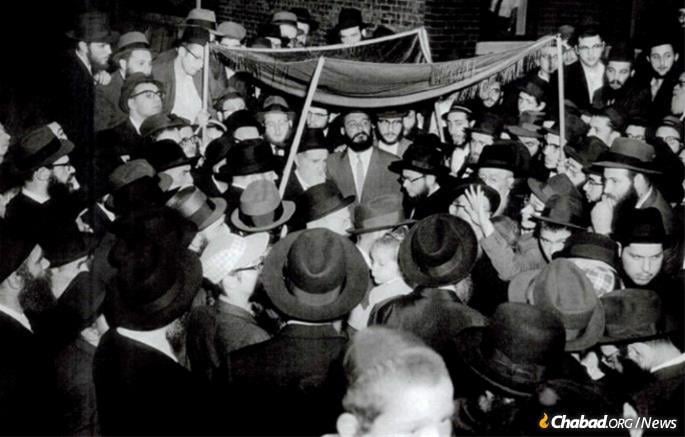
Serving in Israel
The Rebbe then paid for the couple’s airfare to Israel, where they took their place as his emissaries, serving first in Kiryat Gat and Brosh in the country’s south, and then in the village of Avital, in the Taanach region, just minutes from Jenin, then on the other side of the Jordanian border.
In addition to teaching in the local Chabad school, they were active in spreading Jewish awareness and practice in the entire region.
Together with Rabbi Yitzchak and Simcha Yadgar, they founded the Chabad community in Avital, with Rabbi Sasonkin taking the role of mashpia (“mentor”).
With the outbreak of the Six-Day War in June 1967, he served in the armored corps and was among the second wave of soldiers to enter the Sinai Peninsula.
Following a particularly harrowing tour of duty, which included enduring nonstop Egyptian bombardment during the War of Attrition, he traveled to America, where he spoke to the Rebbe about his experiences and left uplifted and energized.
In the late 1960s, he began working at Mesoret Hatikshoret, the forerunner of Bezeq, the Israeli telecom company. Having left teaching behind, albeit with the Rebbe’s express blessing, he worried about not being an emissary of the Rebbe.
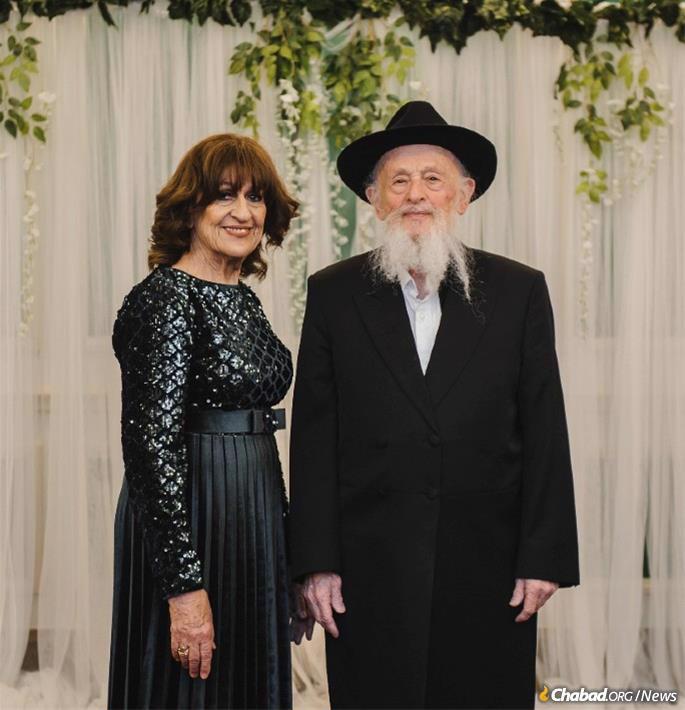
His wife came to America and shared the concern with the Rebbe, who assured her that if “he is happy, brings happiness to others and occasionally discusses Judaism with them, then he is my agent.”
Well-respected within the company, he used his position to ensure that the Rebbe’s gatherings in New York would be broadcast live in Israel’s north.
Due to time differences, he would often rise at 3 a.m. to hear the Rebbe’s talks and then go on to a full day of work.
In 1994, his son Nachum was in a van returning to Brooklyn from visiting the Manhattan hospital where the Rebbe had undergone surgery. As they got on the Brooklyn Bridge, a Lebanese terrorist opened fire, strafing the van with 15 rounds of machine-gun fire. One boy, Ari Halberstam, age 16, was killed, and Nachum was pronounced brain dead.
“They are only doctors,” Avremel was quoted as saying in The New York Times. “They are only given the power to heal. They are not prophets, and they are not given the gift of prophecy.”
With faith and positivity, the Sasonkins moved heaven and earth, and Nachum survived, recovered, and is now the father of a flourishing family of his own.
When the Iron Curtain dropped and Russian-speaking Jews streamed into Israel, he began serving as a mentor in the Russian division of the Chabad yeshivah of Migdal HaEmek.
He was naturally shy and reserved, but he exuded an air of concern, warmth, love and genuine devotion, which his students sensed and reciprocated.
In addition to his wife of 60 years, he leaves their children: Rabbi Moshe Sasonkin (Metulah, Israel); Chanie Kalmenson (Brooklyn, N.Y.); Rabbi Berele Sasonkin (Patchogue, N.Y.); Itty Goldshmid (Valley Stream, N.Y.); Rabbi Nochum Sasonkin (Brooklyn, N.Y.); Rabbi Yechezkel Sasonkin (Arad, Israel); Malky Goldshmid (Philadelphia); and Rabbi Yehuda Sasonkin (Valley Stream, N.Y.)
He was predeceased by his son Rabbi Mendel Sasonkin, a beloved rabbi in Akron, Ohio, in 2018.
